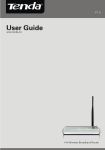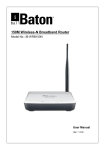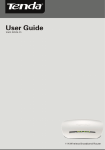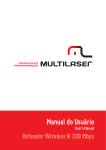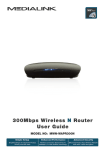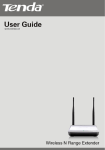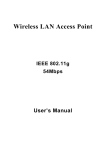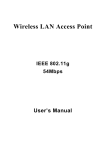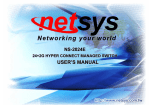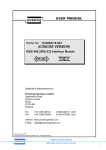Download Tenda A5 Wi-Fi Ethernet LAN White router
Transcript
A5 150Mbps Travel Wireless N Router User Manual
0
A5 150Mbps Travel Wireless N Router User Manual
Copyright Statement
is the registered trademark of Shenzhen Tenda
Technology Co., Ltd. All the products and product names
mentioned herein are the trademarks or registered trademarks of
their respective holders. Copyright of the whole product as
integration, including its accessories and software, belongs to
Shenzhen Tenda Technology Co., Ltd. Without prior expressed
written permission from Shenzhen Tenda Technology Co., Ltd,
any individual or party is not allowed to copy, plagiarize, reproduce,
or translate it into other languages.
All photos and product specifications mentioned in this manual are
for references only. Upgrades of software and hardware may
occur; Tenda reserves the right to revise this publication and to
make changes in the content hereof without obligation to notify
any person or organization of such revisions or changes. If you
would like to know more about our product information, please
visit our website at www.tenda.cn.
1
A5 150Mbps Travel Wireless N Router User Manual
CONTENTS
COPYRIGHT STATEMENT ................................................................ 1 CHAPTER 1 PRODUCT OVERVIEW ............................................... 4 1.1 DESCRIPTION ................................................................................. 4 1.2 PACKAGE CONTENTS ...................................................................... 4 1.3 PANEL OVERVIEW .......................................................................... 4 1.4 MINIMUM SYSTEM REQUIREMENTS ............................................... 5 1.5 OPERATION ENVIROMENT REQUIREMENTS .................................... 6 CHAPTER 2 INSTALLATION............................................................. 7 2.1 HARDWARE INSTALLATION............................................................. 7 2.1.1 WIRED WAN CONNECTION ................................................... 7 2.1.2 WIRELESS WAN CONNECTION .............................................. 8 2.2 CONFIGURE YOUR PC TO CONNECT TO A5 WIRELESSLY ................ 9 2.2.1 IN WINDOWS XP ................................................................... 9 2.2.2 IN WINDOWS 7 .................................................................... 12 2.3 QUICK INTERNET CONNECTION SETUP ......................................... 17 2.3.1 WIRED INTERNET CONNECTION SETUP ............................... 17 2.3.2 WIRELESS INTERNET CONNECTION (WISP) SETUP ............. 19 2.4 QUICK WIRELESS SECURITY SETUP.............................................. 21 CHAPTER 3 CONFIGURATION...................................................... 22 3.1 ADVANCED SETTINGS ................................................................... 22 3.1.1 SYSTEM STATUS .................................................................. 22 3.1.2 WAN SETTINGS................................................................... 23 3.1.3 LAN SETTINGS ................................................................... 28 3.1.4 MAC ADDRESS CLONE ....................................................... 29 3.1.5 DNS SETTINGS.................................................................... 30 3.1.6 WAN MEDIUM TYPE ........................................................... 31 3.1.7 BANDWIDTH CONTROL ....................................................... 32 3.1.8 STATISTICS .......................................................................... 35 3.2 WIRELESS SETTINGS .................................................................... 36 3.2.1 BASIC SETTINGS .................................................................. 36 3.2.2 WIRELESS SECURITY ........................................................... 38 3.2.3 MAC-BASED WIRELESS ACCESS CONTROL......................... 40 2
A5 150Mbps Travel Wireless N Router User Manual
3.2.4 CONNECTION STATUS .......................................................... 41 3.3 DHCP........................................................................................ 42 3.3.1DHCP .................................................................................. 42 3.3.2 DHCP CLIENTS ................................................................... 43 3.4 VIRTUAL SERVER ......................................................................... 45 3.4.1 PORT RANGE FORWARDING ................................................. 45 3.4.2 DMZ SETTINGS ................................................................... 47 3.4.3 UPNP SETTINGS .................................................................. 48 3.5 SECURITY SETTINGS ..................................................................... 48 3.5.1 CLIENT FILTER .................................................................... 49 3.5.2 MAC ADDRESS FILTER ....................................................... 51 3.5.3 URL FILTER ........................................................................ 52 3.5.4 REMOTE WEB-BASED MANAGEMENT.................................. 54 3.6 ROUTING SETTINGS ...................................................................... 55 3.6.1 ROUTING TABLE .................................................................. 55 3.6.2 STATIC ROUTING ................................................................. 56 3.7 TOOLS .......................................................................................... 57 3.7.1 TIME SETTINGS ................................................................... 57 3.7.2 DDNS ................................................................................. 58 3.7.3 BACKUP/RESTORE SETTINGS .............................................. 58 3.7.4 RESTORE TO FACTORY DEFAULT SETTINGS ......................... 61 3.7.5 FIRMWARE UPGRADE .......................................................... 61 3.7.6 REBOOT............................................................................... 62 3.7.7 CHANGE PASSWORD ............................................................ 63 3.7.8 SYSLOG............................................................................... 64 3.7.9 LOGOUT .............................................................................. 64 APPENDIX 1 FEATURES................................................................. 65 APPENDIX 2 SECURITY STATEMENT ......................................... 66 3
A5 150Mbps Travel Wireless N Router User Manual
Chapter 1 Product Overview
1.1 Description
The Tenda 150Mbps Travel Wireless Router (A5) allows
you to create an instant wireless network when you are at hotel,
job site or wherever you need one. Just plug it into an electrical
outlet, connect to your DSL or cable modem, an existing Ethernet
network or a wireless hotspot from ISP (WISP), up to 10 users at
a time can surf, chat, play wirelessly and more using PC, Mac,
iPad, iPhone or other WiFi-enabled devices. Plus, the A5 supports
wired and wireless WAN connections.
1.2 Package Contents
Please unpack the box and check the following items:
◆ A5 150Mbps Travel Wireless Router
◆ Quick Installation Guide
If any of the above items are incorrect, missing, or damaged,
please contact your Tenda reseller for immediate replacement.
1.3 Panel Overview
LED overview:
4
A5 150Mbps Travel Wireless N Router User Manual
The router has only one LED.
It displays a solid light upon and during router’s startup, which
indicates the router is correctly powered and system is starting,
and thereafter, a flashing light.
Port/Button Overview:
Port/Button Description:
Port/Button
Description
WAN
WAN port: Internet port for connection to a
DSL/cable Modem or community broadband via an
Ethernet cable or ISP’s WIFI hotspot.
Reset
Pressing this button for 7 seconds restores the
router to factory default settings.
Note: The RJ45 port functions as a WAN port when you are using
a wired WAN connection and a LAN port when you are using a
wireless WAN (WISP) connection.
1.4 Minimum System Requirements
Computer with:
9
128M or larger memory
9
Windows 98/2000/XP/Vista/WIN7/MAC OS
9
A installed 802.11b/g/n 2.4GHz network adapter
9
Internet broadband service, Ethernet access or WIFI hotspot
9
Microsoft Internet Explorer 5.5, Firefox 1.0 or higher
5
A5 150Mbps Travel Wireless N Router User Manual
1.5 Operation Environment Requirements
9
The device operates correctly only with a specified voltage
rating; otherwise it may be damaged.
9
Keep it away from heat source.
9
Keep it away from electrical appliances (such as a microwave
oven) to avoid electromagnetic interference.
9
Disconnect the device’s power supply in presence of thunder
or storm.
6
A5 150Mbps Travel Wireless N Router User Manual
Chapter 2 Installation
2.1 Hardware Installation
2.1.1 Wired WAN Connection
1. Connect your ADSL/Cable modem to the WAN port on A5 using
an Ethernet cable.
2. Plug A5 into a power outlet nearby.
7
A5 150Mbps Travel Wireless N Router User Manual
2.1.2 Wireless WAN Connection
With the unique wireless WAN feature enabled, the A5 can work
both as a wireless client for connection to a WIFI hotspot or an
Internet-service-enabled wireless router and as a wireless AP to
extend wireless signal to your reachable distance. Here we
explain it using the Tenda W316R, a wireless broadband router.
1. Connect W316R to Internet.
2. Plug A5 into a power outlet nearby.
8
A5 150Mbps Travel Wireless N Router User Manual
2.2 Configure Your PC to Connect to A5 Wirelessly
By default, the RJ45 port is used as a WAN port, so you can
only connect to A5 via a wireless connection. The wireless
security feature is disabled by default. So there is no need to enter
a security key for first-time connection to A5.
To configure your PC to connect to A5 wirelessly, Windows
XP users refer to section 2.2.1 and Windows 7 users skip to
section 2.2.2.
2.2.1 In Windows XP
Step1. Right click “My Network Places” and select “Properties”.
Step2. Right click “Wireless Network Connection” and select
“Properties”.
9
A5 150Mbps Travel Wireless N Router User Manual
Step3. Select “Internet Protocol (TCP/IPv4)” and then click
“Properties”.
Step4. There are 2 ways to configure your PC’s IP address in this
TCP/Ipv4.
A. The first one is “Obtain an IP address automatically” as below:
10
A5 150Mbps Travel Wireless N Router User Manual
In the IP Address field, Input: 192.168.2.XXX (XXX stands for any
value from 2 to 254) and in the Subnet Mask field, input:
255.255.255.0.
For example:
IP Address: 192.168.2.100
Subnet Mask: 255.255.255.0
DNS Server: you can either enter your local DNS server
addresses (Consult your ISP if you are not clear.) or use the
device as a proxy DNS server.
After you finish all settings, click “OK” to submit and click the “OK”
button for properties on Local Area Connection interface to save
them.
Step5. Right click “Wireless Network Connection” and select
select “View Available Wireless Networks”.
11
A5 150Mbps Travel Wireless N Router User Manual
Step6. Select A5’s SSID (wireless network name) and click
“Connect”.
Note: A5’s default SSID is Tenda_XXXXXX (XXXXXX stands for
the last 6 characters in A5’s MAC address).
Step7. When you see “Connected” displayed next to A5’s SSID,
you have successfully connected to A5 wirelessly.
2.2.2 In Windows 7
Step1. Right click “Network” icon on your computer desktop and
select “Properties”.
12
A5 150Mbps Travel Wireless N Router User Manual
Step2. Click “Change adapter settings” on the appearing window.
Step3. Select “Wireless Network Connection” and select
“Properties” in the following window.
Step4. Select” Internet Protocol Version 4(TCP/IPv4)"and then
click “Properties” in the appearing window.
13
A5 150Mbps Travel Wireless N Router User Manual
Step5. There are 2 ways to configure your PC’s IP address in this
TCP/Ipv4.
A. The first one is “Obtain an IP address automatically” as below:
B. The second one is “Use the following IP address” as below:
14
A5 150Mbps Travel Wireless N Router User Manual
In the IP Address field, Input: 192.168.2.XXX (XXX stands for any
value from 2 to 254) and in the Subnet Mask field, input:
255.255.255.0
For example:
IP Address: 192.168.2.100
Subnet Mask: 255.255.255.0
DNS Server: you can either enter your local DNS server
addresses (Consult your ISP if you are not clear.) or use the
device as a proxy DNS server.
After you finish all settings, click “OK” to submit and click the “OK”
button for properties on Local Area Connection interface to save
them.
Step6. Click Network icon and then “Network and Internet Sharing
Center”.
15
A5 150Mbps Travel Wireless N Router User Manual
Step7. Select A5’s SSID (wireless network name) and click
“Connect”.
Step8. When you see “Connected” displayed next to A5’s SSID,
you have successfully connected to A5 wirelessly.
16
A5 150Mbps Travel Wireless N Router User Manual
2.3 Quick Internet Connection Setup
This section instructs you to setup Internet connection quickly.
If you are trying to connect to your ISP via an Ethernet cable, refer
to section 2.3.1 below for assistance; if you are trying a wireless
Internet connection, skip to section 2.3.2.
2.3.1 Wired Internet Connection Setup
Step1. Open a web browser, enter http://192.168.2.1 in the
address bar and then press “Enter”.
Step2. Input the default Password “admin” and click “OK” on the
login window.
Step3. You will be redirected to the quick Internet connection
setup screen below:
17
A5 150Mbps Travel Wireless N Router User Manual
There are 2 Internet connection types on this screen: ADSL
dialup (PPPoE) and Dynamic IP (DHCP).
PPPoE
Select PPPoE, if your ISP are using a PPPoE connection and
enter PPPoE user name and password provided by your ISP. To
secure your wireless network, you are recommended to setup a
wireless security key on this interface. Then click the OK button to
save your settings.
Dynamic IP
Keep this default option if your ISP does not give you any IP
information or account information. You don’t need to configure
any settings for this connection. However for the sake of security,
we recommend you to setup a wireless security key on this
18
A5 150Mbps Travel Wireless N Router User Manual
interface to protect your wireless network from undesired access.
Then click the OK button to save your settings.
Note:
z Contact your ISP if you are not clear about the PPPoE user
name and password.
z Skip to Chapter3 > WAN Settings, if you are using an Internet
connection type other than the above- mentioned.
2.3.2 Wireless Internet Connection (WISP) Setup
To set up your wireless WAN connection, do as follows:
Step1. Follow steps 1-3 on section 2.3.1 to enter the quick Internet
setup interface.
Step2. On the quick Internet setup interface, click “Advanced
Settings” to enter WAN media setting interface.
Step3. Click “Open Scan” on the WAN Medium Type interface to
19
A5 150Mbps Travel Wireless N Router User Manual
display all wireless networks within the range and select the one
you want to connect to (your ISP’s). System will populate the SSID
and Channel fields automatically.
Step4. Configure wireless security settings if required (Select a
security mode, cipher type and enter a security key; all of these
settings must be exactly the same as your wireless ISP’s. If you
are not clear, contact your ISP for assistance).
Step5. Enter WAN Settings interface and select your Internet
connection type (For example, select Dynamic IP if your wireless
ISP does not provide you any IP information.).
20
A5 150Mbps Travel Wireless N Router User Manual
2.4 Quick Wireless Security Setup
There are 2 ways of setting up A5’s wireless security: set it up
on the Quick Internet Connection Setup interface below or set it up
on the Wireless Security Interface under Wireless Settings menu.
Here we only present the former, for the latter, please refer to
section 5.2 hereof.
By default, A5 is preset to WPA-PSK and AES. The security
key allows 8 characters only. Enter your key on the interface below
to secure your wireless network.
21
A5 150Mbps Travel Wireless N Router User Manual
Chapter 3 Configuration
3.1 Advanced Settings
3.1.1 System Status
This section allows you to view WAN information and device
information.
Connection Status: Displays WAN connection status:
Disconnected, Connecting and Connected.
Disconnected: Indicates that the Ethernet cable from your ISP
side is not / not correctly connected to the WAN port on A5 or A5 is
not logically connected to your ISP.
Connecting: Indicates that the WAN port is correctly connected
and is requesting an IP address from your ISP.
Connected: Indicates that A5 has been connected to your ISP.
¾ WAN IP:Displays WAN IP address.
¾ Subnet Mask: Displays WAN subnet mask.
¾ Gateway: Displays WAN gateway address.
¾ Primary DNS: Displays WAN primary DNS address.
¾ Secondary DNS: Displays WAN secondary DNS address.
22
A5 150Mbps Travel Wireless N Router User Manual
¾
Displays current Internet connection type.
System Status:
¾
¾
¾
¾
¾
¾
LAN MAC Address: Displays router’s LAN MAC address.
WAN MAC Address: Displays router’s WAN MAC address.
System Time: Displays the time when system is updated.
Connected client : Displays the number of connected
computers (which obtains IP addresses from the device’
DHCP server).
Software Version:Displays router’s firmware version.
Hardware Version: Displays router’s hardware version.
3.1.2 WAN Settings
There are 5 Internet connection types available for your
selection: PPPoE, Static IP,Dynamic IP,PPTP and L2TP. Select
your
Internet
connection
type
and
follow
corresponding
instructions below:
PPPoE
Select PPPoE, if your ISP are using a PPPoE connection and
provide you with PPPoE user name and password information.
23
A5 150Mbps Travel Wireless N Router User Manual
¾
Mode: Displays current Internet connection type.
¾
Access Account: Enter the user name provided by your ISP.
¾
Access Password: Enter the password provided by your
ISP.
¾
MTU: Maximum Transmission Unit. DO NOT change it from
the factory default of 1492 unless necessary. You may need
to change it for optimal performance with some specific
websites or application software that cannot be opened or
enabled; in this case, try 1450, 1400, etc.
¾
Service Name: Description of PPPoE connection. Leave
blank unless necessary.
¾
Server Name: Description of server. Leave blank unless
necessary.
¾
Connect Automatically: Connects automatically to the
Internet upon device startup or disconnection from the
Internet.
¾
Connect Manually: Users need to connect the device to
24
A5 150Mbps Travel Wireless N Router User Manual
Internet manually upon disconnection from the Internet.
¾
Connect on Demand: Connects to Internet automatically
upon traffic present.
¾
Connect on Fixed Time: Connects to Internet automatically
within the specified time length.
Note:
To activate the “Connect on Fixed Time" feature, you must
first configure current time on the "Time Settings” screen under
"System Tools" menu.
Static IP
If your ISP offer you static IP Internet connection type, select
“Static IP" from Mode drop-down menu and then enter IP address,
subnet mask, Primary DNS and secondary DNS information
provided by your ISP into corresponding fields.
¾
Mode: Displays the current Internet connection type.
¾
IP Address: Enter the WAN IP address provided by your ISP.
Inquire your ISP if you are not clear.
¾
Subnet Mask: Enter WAN Subnet Mask provided by your ISP.
The default is 255.255.255.0.
25
A5 150Mbps Travel Wireless N Router User Manual
¾
Gateway: Enter the WAN Gateway provided by your ISP.
¾
DNS Server: Enter the necessary DNS address provided by
your ISP.
¾
Alternate DNS Server: Enter the secondary DNS address if
¾
your ISP provides, and it is optional.
MTU: Maximum Transmission Unit. DO NOT change it from
the factory default of 1500 unless necessary. You may need
to change it for optimal performance with some specific
websites or application software that cannot be opened or
enabled.
Dynamic IP (DHCP)
Select this option if your ISP does not give you any IP
information or account information. You don’t need to configure
any settings for this connection.
¾
¾
Mode: Displays the current Internet connection type.
MTU: Maximum Transmission Unit. DO NOT change it from
the factory default of 1500 unless necessary. You may need
to change it for optimal performance with some specific
websites or application software that cannot be opened or
enabled; in this case, try 1450, 1400, etc.
26
A5 150Mbps Travel Wireless N Router User Manual
PPTP
¾
¾
¾
¾
Mode: Displays the current Internet connection type.
PPTP server address: Enter the IP address of a PPTP
server.
Username/Password: Enter Username/Password specified
by the PPTP server.
MTU: Maximum Transmission Unit. DO NOT change it from
the factory default of 1492 unless necessary. You may need
to change it for optimal performance with some specific
websites or application software that cannot be opened or
¾
¾
¾
¾
enabled; in this case, try 1450, 1400, etc.
Address mode: Select “Dynamic” if you don’t get any IP
information from the PPTP server, otherwise select “Static”.
IP address: Enter the IP address information provided by
your ISP (PPTP server). Inquire your local ISP if you are not
clear (Static IP address mode only).
Subnet mask: Enter the subnet mask provided by your ISP,
normally, 255.255.255.0 (Static IP address mode only).
Gateway: Enter the gateway provided by your ISP (Static IP
27
A5 150Mbps Travel Wireless N Router User Manual
address mode only). Inquire your local ISP if you are not
clear.
L2TP
¾
¾
¾
¾
¾
¾
¾
Mode: Displays the current Internet connection type.
L2TP server address: Enter the IP address of a L2TP
server.
Username/Password: Enter Username/Password specified
by the PPTP server.
Address mode: Enter the IP address information provided
by your ISP (PPTP server). Inquire your local ISP if you are
not clear (Static IP address mode only).
IP address: Enter the IP address information provided by
your ISP (PPTP server). Inquire your local ISP if you are not
clear (Static IP address mode only).
Subnet mask: Enter the subnet mask provided by your ISP,
normally, 255.255.255.0 (Static IP address mode only).
Gateway: Enter the gateway provided by your ISP (Static IP
address mode only). Inquire your local ISP if you are not
clear.
3.1.3 LAN Settings
28
A5 150Mbps Travel Wireless N Router User Manual
Click “Advanced Settings”----“LAN Settings” to enter the
interface below.
¾
LAN MAC Address: Displays the router’s LAN MAC address,
which cannot be changed.
¾
IP Address: The default LAN IP address for this router is
192.168.2.1. You can change it according to your need.
¾
Subnet Mask: Enter the Router’s LAN subnet mask. The
default value is 255.255.255.0.
3.1.4 MAC Address Clone
This section allows you to configure router’s WAN MAC
address.
Some ISP may require binding an accepted MAC address
for communication. If the bound MAC address differs from your
router’s predefined WAN MAC address, then you need to replace
29
A5 150Mbps Travel Wireless N Router User Manual
the router’s WAN MAC with the bound MAC for achieving valid
communication with your ISP.
¾
Clone MAC Address: Clicking this button changes router’s
WAN MAC address from default to the MAC address of the
PC you are currently on. Don’t use this button unless your
PC’s MAC address is the one bound by your ISP.
¾
Restore Default MAC: Restores router’s WAN MAC to
default settings.
3.1.5 DNS Settings
The Domain Name System (DNS) is a hierarchical naming
system for computers, services, or any resource connected to the
Internet or a private network. It functions just as the "phone book"
for the Internet by translating human-friendly domain names into
numerical identifiers of IP addresses for the purpose of locating
and addressing these devices worldwide.
¾
DNS Setting: Check the box to enable DNS settings.
¾
Primary DNS address: Enter the DNS server address
provided by your ISP.
¾
Alternate DNS Address: Enter the secondary DNS address
30
A5 150Mbps Travel Wireless N Router User Manual
if your ISP offers you 2 DNS addresses (Optional).
Note:
1. Wrong DNS server addresses will lead to failure in accessing
websites.
2. To activate the new settings, reboot the device.
3.1.6 WAN Medium Type
The A5 supports 2 types of WAN media: wired WAN (via
Ethernet cable) and wireless WAN (WISP). By default, it is preset
to wired WAN.
¾
¾
¾
¾
Wired WAN: Select this mode if you are using an Ethernet
cable from your ISP to connect to the router’s WAN port.
Wireless WAN: Use this mode if your ISP provides you
wireless Internet connection service or you want to amplify
wireless signal.
SSID:SSID (Service Set Identifier). Enter your ISP’s SSID.
You can also enable “Open Scan” to obtain a list of available
ISP SSIDs and then select your ISP’s SSID to let system
populate the SSID field automatically.
Channel: Select a channel that corresponds to the ISP’s
SSID you select. You can view it in a scanned SSID list if you
31
A5 150Mbps Travel Wireless N Router User Manual
¾
enable the “Scan” function.
Security Mode: Configure the same settings on your router
as those on your ISP’s side for wireless security.
For example: If your ISP’s SSID is “NS_WIR300N” and
channel is 1, then enter “NS_WIR300N” in the SSID box and
select 1 from the channel drop-down menu; or you can let system
automatically populate the SSID field and select the right channel
by selecting your ISP’s SSID from the scan list provided that you
enabled the “Open Scan” function on the interface below. You
must configure the same settings on your router as those on your
ISP’s side for wireless security to achieve successful connection.
Save the settings on this interface and go to WAN Settings to
select your Internet connection type (for example, if your ISP is
using a dynamic IP connection on its wireless device, then you
need to select DHCP/Dynamic IP.).
3.1.7 Bandwidth Control
Bandwidth control can be used to simultaneously regulate
32
A5 150Mbps Travel Wireless N Router User Manual
traffic of up to 254 computers on your LAN network. You can
regulate a group of PCs’ traffic by specifying a range of IP
addresses.
¾
Enable Bandwidth Control : Check the box to enable
bandwidth control.
¾
IP Address:Enter an IP address (same number in both
boxes) or a range of IP addresses (different numbers in two
boxes) of the PCs whose traffic you want to regulate.
¾
Upload /Download:You can select either to limit Uplink or
Downlink Bandwidth of PCs within a specified IP range.
¾
Bandwidth Range:Maximum and minimum data flow which
is permitted to be uploaded/downloaded by computers within
a specified IP range. Unit is Kbytes/s. (For WAN bandwidth
¾
range, consult your ISP.)
Enable: Check the box to enable edit. Leaving it unchecked
means disabling the function.
¾
Add to List: Click it to add currently edited bandwidth control
rule to the list when finishing.
33
A5 150Mbps Travel Wireless N Router User Manual
1. For example: Suppose that you have a 2M WAN connection,
then maximum download and upload rates in theory will be
2Mbps=256KByte/s and 512kbps=64KByte/s. And you want
the PC at the IP address of 192.168.2.100 to have
10-15KByte/s upload and 80-90KByte/s download rates. Then
follow instructions below:
First, add an upload rule as shown in the figure below:
Step1. Enter 192.168.2.100 in IP address boxes.
Step2. Select Upload from the corresponding drop-down menu.
Step3. Enter 10~15 in bandwidth range box
Step4. Check the “Enable” box.
Step5. Click “Add to List”.
Step6. Click “OK” to finish settings.
Then, follow steps above to add a download rule.
34
A5 150Mbps Travel Wireless N Router User Manual
2. For example, supposing that you want PCs within the IP range
of 192.168.2.2--192.168.2.254 to have 100-120KByte/s download
rate and 20-30KByte/s upload rate, then repeat same settings
shown on the below interface on your router:
3.1.8 Statistics
Statistics dynamically displays bandwidth usage by PCs on
your LAN.
¾
¾
Enable Traffic Statistics: Check the box to gather bandwidth
usage by PCs on your LAN. It is disabled by default.
Disabling this option may boost router’s packet handling
capacity. When enabled, system will dynamically renew
statistics information every 5 minutes.
IP Address: Displays IP address information of a
corresponding statistics item.
35
A5 150Mbps Travel Wireless N Router User Manual
¾
¾
¾
¾
¾
¾
Uplink Rate: Displays the amount of packets transmitted per
second in KByte/s.
Downlink Rate: Displays the amount of packets received per
second in KByte/s.
Sent Message (TX Packets): Displays the total amount of
packets transmitted by a corresponding IP address through
the router.
Sent Bytes: Displays the total amount of bytes transmitted by
a corresponding IP address through the router. The unit is
MByte.
Received Message (RX Packets):
Displays the total
amount of packets received by a corresponding IP address
from the router.
Recieved Bytes: Displays the total amount of bytes received
by a corresponding IP address from the router. The unit is
MByte.
3.2 Wireless Settings
3.2.1 Basic Settings
36
A5 150Mbps Travel Wireless N Router User Manual
¾
Network Mode: Select a right mode according to your wireless
client. The default mode is 11b/g/n mixed.
¾
11b mode:Select it if you have only Wireless-B clients in
your wireless network.
¾
11g mode:Select it if you have only Wireless-G clients in
your wireless network.
¾
11b/g mixed mode: Select it if you have only Wireless-B and
Wireless-G clients in your wireless network.
¾
11b/g/n mixed mode: Select it if you have Wireless-B,
Wireless-G and Wireless-N clients in your wireless network.
¾
Broadcast (SSID): Select “Disable” to hide your SSID. With
this option disabled, no wireless clients will be able to see
your wireless network when they perform a scan to see
what’s available. If they want to connect to your router, they
will have to first know this SSID and then manually enter it on
their devices. By default, this option is enabled.
¾
Channel: The Channel can be changed to fit the channel
setting for an existing wireless network or to customize the
wireless network. From the drop-down list,you can select a
most effective channel, which ranges from 1 to 11. You can
also select “Auto Select” to let system detect and choose one
¾
¾
¾
that best fits your network.
WMM-Capable:Enabling this option may boost transmission
capacity of wireless multimedia data (such as online video
play).
ASPD Capable : Auto power saving mode, disabled by
default.
Channel Bandwidth: Select a proper channel bandwidth to
37
A5 150Mbps Travel Wireless N Router User Manual
enhance wireless performance. When there are 11b/g and
11n wireless clients, please select the 802.11n mode of
20/40M frequency band; when there are only non-11n
wireless clients, select 20M frequency band mode; when the
wireless network mode is 11n mode, please select 20/40
frequency band to boost its throughput.
¾
Extension
Channel : Indicates
the
working network
frequency range for 11n mode.
3.2.2 Wireless Security
This section allows you to configure wireless encryption to
block unauthorized access to your wireless network and prevent
malicious packet sniffing. You have 3 ways to encrypt your data:
WEP, WPA-PSK and WPA2-PSK.
1. WEP (Wired Equivalent Privacy)
WEP is intended to provide data confidentiality comparable to
that of a traditional wired network. Two methods of authentication
can be used with WEP: Open System authentication and Shared
Key authentication.
38
A5 150Mbps Travel Wireless N Router User Manual
¾
Select SSID: Select a SSID that you want to encrypt. Both
SSIDs can be encrypted respectively.
¾
Security Mode: Select a proper mode from the drop-down
¾
menu.
Default Key: Select one key from the 4 preset keys.
2、 WPA-PSK
The WPA protocol implements the majority of the IEEE
802.11i standard. It enhances data encryption through the
Temporal Key Integrity Protocol (TKIP) which is a 128-bit
per-packet key, meaning that it dynamically generates a new key
for each packet. WPA also includes a message integrity check
feature to prevent data packets from being hampered with. Only
authorized network users can access the wireless network.
¾
Security Mode: Select a proper mode that is also supported
by your wireless clients.
¾
WPA Algorithms: Select either AES (advanced encryption
standard) or TKIP (temporary key integrity protocol) type.
¾
Key: Enter a security key,which must be between 8-63 ASCII
characters.
¾
Key Renewal Interval: Set a valid period for the security key.
39
A5 150Mbps Travel Wireless N Router User Manual
3、WPA2-PSK
3.2 The later WPA2 protocol features compliance with the
full IEEE 802.11i standard and uses Advanced Encryption
Standard (AES) in addition to TKIP encryption protocol to
guarantee better security than that provided by WEP or WPA.
3.2.3 MAC-based Wireless Access Control
The MAC-based Wireless Access Control feature can be
used to allow or disallow clients to connect to your wireless
network.
¾
¾
¾
MAC Address Filter: “Permit” means to permit PCs at
specified MAC addresses to connect to your wireless network
while “Forbid” means to block PCs at specified MAC
addresses from connecting to your wireless network.
MAC Address:Enter the MAC addresses of a wireless client
and click “Add”.
MAC Address List: Displays the MAC addresses added by
you. You can delete any entry by clicking on the “Delete”
button next to it.
Example 1:
To allow only a PC at the MAC address of 00:e8:c8:a4:56:75 to
connect to your wireless network, do as follows:
40
A5 150Mbps Travel Wireless N Router User Manual
Step1. Select “Permit” from MAC Address Filter drop-down menu.
Step2. Enter 00:e8:c8:a4:56:75 in the MAC address box.
Step3. Click the “OK” button to save your settings and you can add
more MAC addresses, if you like, simply repeating the above
steps.
Example 2:
To prohibit only a PC at the MAC address of
00:c2:a5:67:d4:23 from connecting to your wireless network, do as
follows:
3.2.4 Connection Status
This interface displays the information of currently connected
wireless clients including MAC addresses and bandwidth.
41
A5 150Mbps Travel Wireless N Router User Manual
MAC Address: Displays the MAC addresses of the PCs that have
been wirelessly connected to your router.
Bandwidth: Displays the channel channel bandwidth used by the
currently connected hosts (connected wireless clients).
Note:"Bandwidth" refers to the wireless channel bandwidth
instead of wireless connection rate.
3.3
DHCP
3.3.1 DHCP
The Dynamic Host Configuration Protocol (DHCP) is an
automatic configuration protocol used on IP networks. If you
enable the built-in DHCP server on A5, it will automatically
configure the parameters of TCP/IP protocol for all your LAN
computers (including IP address, subnet mask, gateway and DNS
etc), eliminating the need for manual intervention. Be sure to set
your computers to be DHCP clients by setting their TCP/IP
settings to “Obtain an IP Address Automatically”. When you turn
your computers on, they will automatically load the proper TCP/IP
settings provided by the A5.
42
A5 150Mbps Travel Wireless N Router User Manual
¾
DHCP Server: Check or uncheck the box to Enable or
disable the device’s DHCP server feature.
¾
IP pool start address: Enter the starting IP address for the
DHCP server’s IP assignment.
¾
IP pool end address: Enter the ending IP address for the
DHCP server’s IP assignment.
¾
Lease Time: The length of time for the IP address lease.
Configuring a proper lease time improves the efficiency for
the DHCP server to reclaim disused IP addresses.
3.3.2 DHCP Clients
This section not only displays a DHCP dynamic client list but
also includes a configurable Static DHCP assignment feature.
The DHCP client list displays the obtained IP addresses from A5’s
built-in DHCP server, MAC addresses, host names and lease time.
If you would like some devices on your network to always have
fixed IP addresses, you can manually add a static DHCP
assignment entry for each such device. You can manually add an
IP address and a MAC address and check the IP-MAC Binding
option, and then whenever a host with this MAC address connects
to the router, it will always get the same IP address (the one you
43
A5 150Mbps Travel Wireless N Router User Manual
just added). According to the connected computer's MAC address,
the router checks relevant entries in its DHCP reservation list and
decides what IP address to assign to this host (an unused IP from
DHCP IP address pool, or a reserved one): If it fails in finding a
reserved IP address bound to the PC with this MAC address in the
list, it will immediately assign an unused IP from its DHCP IP
address pool; and if such IP is found, it will be assigned to this
host so as to ensure that host with a DHCP reservation always get
this fixed reserved IP address. Once a host registers DHCP
reservation to have a fixed IP address bound to its MAC address,
it can not use a different IP address except this one to connect to
the router for Internet access. Thus, due to DHCP reservation, a
host is prevented from escaping monitoring by changing its IP
address.
¾
IP Address: Enter the IP address which needs static binding.
¾
MAC Address: Enter the MAC address of the computer you
want to bind.
44
A5 150Mbps Travel Wireless N Router User Manual
¾
Host name: It displays the name of the bound computer.
¾
Lease Time: The remaining time for the corresponding IP
address lease.
3.4 Virtual Server
3.4.1 Port Range Forwarding
Port Range forwarding feature allows you to open a single or
a range of WAN service ports and redirect all traffic received
through these ports to a LAN server with a designated IP address.
It allows remote computers, such as computers on the Internet, to
connect to a specific computer or service within a private local
area network (LAN).
¾
Start/End Port: Enter the service port range provided by the
mapped host in internal network.
¾
LAN IP: The IP address of the computer which is used as a
server in LAN.
¾
Protocol: Includes TCP, UDP and Both. Select “Both” when
45
A5 150Mbps Travel Wireless N Router User Manual
you are not sure about which protocol to use.
¾
Enable:
Check
the
“Enable”
option
to
activate
the
delete
the
corresponding rule next to it.
¾
Delete:
Check
the
“Delete”
option
to
corresponding rule next to it.
¾
Well-Known Service Ports: The “Well-Known Service Port”
provides commonly used protocol ports. Select one from
them and then click the “Add to” button to automatically add
selected port to the Start Port-End Port fields of the
corresponding rule ID. You can also manually add the ports
which are not included in the “Well-Known Service Port”.
¾
Add to: Add a selected Well-Known Service Port to the Start
Port-End Port boxes of the rule you select.
For example:
You want to share some large files with your friends who are
not in your LAN; however it is not convenient to transfer such large
files. Then, you can set up your own PC as a FTP server and use
the port range forwarding feature to let your friends access these
files. Provided that the static IP address of the FTP server (Namely,
your PC) is 192.168.2.10 and you want your friends to access this
FTP server through default port 21 and TCP protocol, then you
can follow the steps below for configurations.
1. Enter 21 for both the start and end port in ID 1, or select "FTP"
from “Well-Known Service Port” and port 21 will be added
automatically to ID 1.
2. Enter 192.168.2.10 for the "IP Address", select "TCP" and then
select "Enable'.
46
A5 150Mbps Travel Wireless N Router User Manual
3. The configured parameters are shown in the screen below.
4. Click "OK".
Now, your friends only need to enter ftp://xxx.xxx.xxx.xxx:21
in their browsers to access your FTP server. xxx.xxx.xxx.xxx is the
device's WAN IP address. For example, if it is 172.16.102.89, then
your friends only need to enter "ftp://172.16.102.89:21" in address
fields of their respective browsers.
3.4.2 DMZ Settings
In some cases, we need to set a computer to be completely
exposed to extranet for implementation of a 2-way communication.
To do so, we set it as a DMZ host.
¾
DMZ Host IP Address: Enter the IP address of a LAN
47
A5 150Mbps Travel Wireless N Router User Manual
computer which you want to set to a DMZ host.
¾
Enable: Check/uncheck to enable/disable the DMZ host.
For example:
You can set a LAN computer at the IP address of
192.168.2.10 as a DMZ Host to intercommunicate with another
host on the Internet.
NOTE:
If you set a PC to a DMZ host, it will be completely exposed to
extranet and gains no more protection from the device firewall.
3.4.3 UPnP Settings
UPnP (Universal Plug and Play) allows a network device to
discover and connect to other devices on the network. With this
feature enabled, hosts in LAN can request the device to perform
special port forwarding so as to enable external hosts to access
resources on internal hosts.
¾
Enable UPnP: Check/uncheck to enable/disable the UPnP.
Note: UPnP works in Windows XP, Windows ME or later
operational systems (NOTE: Operational system needs to be
integrated with or installed with Directx 9.0) or in an environment
with installed application software that supports UPnP.
3.5 Security Settings
48
A5 150Mbps Travel Wireless N Router User Manual
3.5.1 Client Filter
To better manage the computers in LAN, you can regulate
LAN computers’ access to some ports on Internet through using
Client Filter functionality.
¾
Filter Mode: Select Disable, Forbid only or Permit only
according to your own needs.
¾
Access Policy: Select a number (indicating a filter rule) from
the drop-down menu.
¾
Remark: Enter a meaningful name to you for a new filter rule.
¾
Start /End IP Address: Enter a starting/ending IP address.
¾
Port: Enter TCP/UDP protocol port; it can be a port range.
¾
Type: Select a protocol or protocols for the traffic
(TCP/UDP/Both).
¾
Time: Select a time range for the rule to take effect.
¾
¾
Day: Select a day or several days for the rule to take effect.
Enable: Check to enable or uncheck to disable a
corresponding filter rule (allow/disallow matched packets to
49
A5 150Mbps Travel Wireless N Router User Manual
pass through router).
Example 1: To prohibit PCs within the IP address range of
192.168.2.100--192.168.2.120 from accessing Internet, do as
follows:
Example 2: To allow only the computer at an IP address of
192.168.2. 145 to access Internet from 8:00 to 18:00 without
restricting other computers in LAN, do as follows:
50
A5 150Mbps Travel Wireless N Router User Manual
3.5.2 MAC Address Filter
To better manage the computers in LAN, you can use the MAC
Address Filter function to control the computer’s access to
Internet.
¾
Filter Mode: Select Disable, Forbid only or Permit only
according to your own needs.
¾
Access Policy: Select a number (indicating a filter rule) from
the drop-down menu.
¾
Remark: Enter a meaningful name to you for a new filter rule.
¾
MAC address: Enter the computer’s MAC address that you
want to filter out in the MAC address field.
¾
Time: Select a time range for the new MAC address filter rule
to take effect.
¾
¾
¾
Day: select a day or several days for the new MAC address
filter rule to take effect.
Enable: Check to enable or uncheck to disable a
corresponding filter rule (allow/disallow matched packets to
pass through router).
OK: Click “OK” to activate new settings.
51
A5 150Mbps Travel Wireless N Router User Manual
Example1: To prevent a PC at the MAC address of
00:E0:4C:69:A4:10 from accessing Internet within the time range
of 8:00-18:00 from Monday to Friday do as follows:
Example1: To allow only the PC at a MAC address of
00:E4:A5:44:35:69 to access Internet from Monday to Friday, do
as follows:
3.5.3 URL Filter
To better control the LAN computers’ access to websites, you
can use URL filtering to deny their access to certain websites
52
A5 150Mbps Travel Wireless N Router User Manual
within a specified time range.
¾
Filter Mode: Select Disable or Forbid only according to your
own needs.
¾
Access Policy: Select a number (indicating a filter rule) from
the drop-down menu.
¾
Remark: Enter a meaningful name to you for a new filter rule.
¾
Start/End IP Address: Enter the starting/ending IP address.
¾
URL character string: Enter domain names or a part of a
domain name that needs to be filtered.
¾
Time: Select a time range for the new URL filter rule to take
effect.
¾
Day: select a day or several days for the new MAC address
filter rule to take effect.
¾
Enable: Check to enable or uncheck to disable a
corresponding filter rule (allow/disallow matched packets to
pass through router).
¾
OK: Click “OK” to activate the settings.
For example:
53
A5 150Mbps Travel Wireless N Router User Manual
If you want to disallow all computers on your LAN to access
“yahoo.com” at the time range of 8:00-18:00 from Monday to
Friday, then do as follow:
Note: Each URL character string entry can corresponde
to only a domain name. So you need to set multiple rules if
you want to filter out multiple domain names.
3.5.4
Remote Web-based Management
The Remote Web-based Management feature allows users to
configure your router from Internet via a web browser.
54
A5 150Mbps Travel Wireless N Router User Manual
¾
¾
¾
Enable: Check or uncheck to enable or disable the remote
web-based management feature.
Port: Enter a port number for remote web-based
management.
IP Address: Enter the IP address of a PC on Internet
authorized to access and manage your router’s web-based
utility remotely.
For example: If you want to allow a PC at the IP address of
218.88.93.33 to access your router’s web-based utility from
Internet via port: 8080, you need to configure same settings
shown in the diagram above on your router. And what this IP user
needs to do is to simply launch a browser and enter http:
//220.135.211.56:8080 (provided that your router’s WAN IP
address is 220.135.211.56).
Note:
If you enter 0.0.0.0 in the IP address box, then all PCs on
Internet can access your router’s Web-based utility to view or
change your settings remotely once you enable the remote
Web-based management feature.
3.6 Routing Settings
3.6.1 Routing Table
This page displays the router’s core routing table which lists
destination IP address, subnet mask, gateway, hop count and
interface.
55
A5 150Mbps Travel Wireless N Router User Manual
The main duty for a router is to look for an optimal transfer
path for each data packet passing through it, and transfer it to the
specified destination. So, it’s essential for the router to select an
optimal path, i.e. routing algorithm. To complete this work, the
router stores the related information of various transfer paths, i.e.
establishing a routing table, for future route selection.
3.6.2 Static Routing
You can use this section to set up router’s routing feature.
¾
¾
¾
Destination Network IP Address: Enter a destination IP
address or subnet.
Subnet Mask: Enter a Subnet Mask that corresponds to
destination IP address or subnet you entered.
Gateway: Next-hop IP address.
1. Gateway IP address must be on the same subnet with
LAN/WAN IP address.
56
A5 150Mbps Travel Wireless N Router User Manual
2. If Destination IP address box is entered with a single IP
address, then corresponding subnet mask must be set to
255.255.255.255.
3. If Destination IP address box is entered with an IP subnet,
then corresponding subnet mask must be set to 255.0.0.0.
3.7 Tools
3.7.1 Time Settings
This section assists you in setting the device’s system time;
you can either select to set the time and date manually or
automatically obtain the GMT time from Internet.
NOTE:
The configured time information loses once the router is
powered off. But it obtains the GMT time automatically when
you connect it to the Internet. Features/functions based on
time (e.g. security settings) take effect only after Time and
Date settings are configured manually or updated
automatically from Internet.
57
A5 150Mbps Travel Wireless N Router User Manual
3.7.2 DDNS
Dynamic DNS or DDNS is a term used for the updating in real
time of Internet Domain Name System (DNS) name servers.
We use a numeric IP address allocated by Internet Service
Provider (ISP) to connect to Internet; the address may either be
stable ("static"), or may change from one session on the Internet
to the next ("dynamic"). However, a numeric address is
inconvenient
to
remember;
an
address
which
changes
unpredictably makes connection impossible.
The DDNS provider allocates a static hostname to the user;
whenever the user is allocated a new IP address this is
communicated to the DDNS provider by software running on a
computer or network device at that address; the provider
distributes the association between the hostname and the address
to the Internet's DNS servers so that they may resolve DNS
queries. Thus, uninterrupted access to devices and services
whose numeric IP address may change is maintained.
¾
DDNS Service: Click Enable or Disable radio button to
enable/disable the DDNS feature.
58
A5 150Mbps Travel Wireless N Router User Manual
¾
Service Provider: Select your DDNS service provider from
the drop-down menu.
¾ Username: Enter the DDNS username provided by your
DDNS service provider.
¾ Password: Enter the DDNS password provided by your
DDNS service provider.
¾ Domain Name: Enter the DDNS domain name distributed by
your DDNS service provider.
For example: If you have registered a DDNS service in
dyndns.org and are allocated with tenda, 123456,
tenda.dyndns.info respectively as username, password and
domain name for a web server on your PC at 192.168.2.10, then
configure port settings on port range forwarding interface under
virtual server menu and enter this information on the above DDNS
interface. Others can access your web server by simply entering
http://tenda.dyndns.info in their browser ’s address bar.
3.7.3 Backup/Restore Settings
This section allows you to backup current settings or to
restore the previous settings configured on the device.
Backup Settings: Once you have configured the router the way
you want it, you can save these settings to a configuration file on
your local hard drive that can later be imported to your router in
59
A5 150Mbps Travel Wireless N Router User Manual
case that the router is restored to factory default settings. To do
this, click the “Backup” button next to where it says “Select the file
directory to save the configured parameters” on the screen above.
And then,click the “Save” button on the appearing screen above
to store it under the selected path.
Restore Settings: Click the "Browse" button to locate and select
a configuration file that is saved previously to your local hard drive.
And then click the "Restore" button to reset your router to previous
settings.'
60
A5 150Mbps Travel Wireless N Router User Manual
3.7.4 Restore to Factory Default Settings
To restore all settings to the device's factory default values,
click the "Restore to Factory Default” button on the interface
below:
Factory Default Settings:
¾
Password: admin
¾
IP Address: 192.168.2.1
¾
Subnet Mask: 255.255.255.0
Note: To activate your configurations, reboot the device after
you reset the router.
3.7.5
Firmware Upgrade
Firmware upgrade is released periodically to improve the
functionality of your router and also to add new features. If you run
into a problem with a specific feature of the router, log on to our
61
A5 150Mbps Travel Wireless N Router User Manual
website(www.tenda.cn)to download the latest firmware to update
your router.
¾
Browse: Click this button to select an upgrade file.
¾
Upgrade: Click this button to start an upgrading process.
After the upgrade is completed, the Router will reboot
automatically.
NOTE: Do not disconnect the router from your management
PC (the PC you use to configure the router) or power off the
router during the upgrade process; otherwise, it may be
permanently damaged. The router will restart automatically
when the upgrade process, which takes several minutes,
completes.
3.7.6 Reboot
By Rebooting the device,new settings can be brought into
effect. And WAN connection will be cut automatically during this
process.
62
A5 150Mbps Travel Wireless N Router User Manual
¾
Reboot: Click this button to reboot the device.
3.7.7 Change Password
On the screen below, you can change the password for login
to the device's Web-based interface.
¾
Old Password: Enter the old password.
¾
New Password: Enter a new password.
¾
Confirm new Password: Re-enter the new password for
confirmation.
If you enter a correct old password, then clicking the "OK"
button saves your new password.
NOTE: For the sake of security, it is highly recommended that you
change default login password and user name.
63
A5 150Mbps Travel Wireless N Router User Manual
3.7.8 SysLog
The Syslog option allows you to view all events that occur
upon system startup and check whether there is attack on your
network.
¾
Refresh: Click this button to update the log.
¾
Clear: Click this button to clear the log record.
3.7.9
Logout
After you have finished all settings, click the Logout tab to exit
the utility.
64
A5 150Mbps Travel Wireless N Router User Manual
Appendix 1 Features
¾
Compliant or compatible with 802.11n, 802.11g, 802.11b,
802.3, 802.3u
¾
Delivers wireless speed up to 150Mbps
¾
¾
1*10/100Mbps auto-negotiation LAN/WAN port
Can be connected to a xDSL/Cable MODEM or community
broadband (Dynamic/static IP internet connection type)
Supports WEP, WPA-PSK, WPA2-PSK and
WPA&WPA2-PSK security modes
WISP feature to connect to ISP’s wireless hot spot.
Supports hidden SSID and MAC-based access control
features
Support WMM to stream your video and audio
Supports SNTP, UPnP, DDNS, virtual server and DMZ
Provides syslog to record all events occurring upon system
startup
¾
¾
¾
¾
¾
¾
65
A5 150Mbps Travel Wireless N Router User Manual
Appendix 2 Security Statement
FCC Statement
This equipment has been tested and found to comply with the
limits for a Class B digital device, pursuant to part 15 of the FCC
rules. These limits are designed to provide reasonable protection
against harmful interference in a residential installation. This
equipment generates, uses and can radiate radio frequency
energy and, if not installed and used in accordance with the
instructions,
may
cause
harmful
interference
to
radio
communications. However, there is no guarantee that interference
will not occur in a particular installation. If this equipment does
cause harmful interference
to radio or television reception, which can be determined by
turning the equipment off and on, the user is encouraged to try to
correct the interference by one or more of the following measures:
-Reorient or relocate the receiving antenna.
-Increase the separation between the equipment and receiver.
-Connect the equipment into an outlet on a circuit different from
that to which the receiver is connected.
-Consult the dealer or an experienced radio/TV technician for
help.
To assure continued compliance, any changes or modifications
not expressly approved by the party responsible for compliance
could void the user’s authority to operate this equipment.
(Example- use only shielded interface cables when connecting to
computer or peripheral devices).
66
A5 150Mbps Travel Wireless N Router User Manual
“The antenna(s) used for this transmitter must not be co-located or
operating in conjunction with any other antenna or transmitter.”
FCC Radiation Exposure Statement
This equipment complies with FCC radiation exposure limits set
forth for an uncontrolled environment. This equipment
should be installed and operated with the minimum distance
of 20 cm. Operation is subject to the following two conditions:
1) This device may not cause interference, and
2) This device must accept any interference, including interference
that may cause undesired operation of the device.
Caution!
The manufacturer is not responsible for any radio or TV
interference caused by unauthorized modifications to this
equipment. Such modifications could void the user authority to
operate the equipment.
Eu Declaration or Declaration of Conformity
Hereby, SHENZHEN TENDA TECHNOLOGY CO.,LTD, declares
that this wireless router is in compliance with the essential
requirements
and
other
relevant
1999/5/EC.
67
provisions
of
Directive




































































